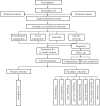A multicenter randomized trial of personalized acupuncture, fixed acupuncture, letrozole, and placebo letrozole on live birth in infertile women with polycystic ovary syndrome - PubMed (original) (raw)
doi: 10.1186/s13063-020-4154-1.
Min Hu 1 2, Ernest Hung Yu Ng 3, Elisabet Stener-Victorin 2 4, Yanhua Zheng 5, Qidan Wen 1, Cong Wang 6, Maohua Lai 1, Juan Li 1, Xingcheng Gao 7, Xinhua Wang 1 2, Zhenxing Hu 8, Tian Xia 9, Rongkui Hu 10, Jianping Liu 2 11, Xiaohui Wen 1, Shuna Li 1, Kewei Quan 12, Xingyan Liang 1, Hongcai Shang 2 13, Hongxia Ma 14 15, Jie Qiao 16
Affiliations
- PMID: 32131886
- PMCID: PMC7057514
- DOI: 10.1186/s13063-020-4154-1
A multicenter randomized trial of personalized acupuncture, fixed acupuncture, letrozole, and placebo letrozole on live birth in infertile women with polycystic ovary syndrome
Shiya Huang et al. Trials. 2020.
Abstract
Background: Traditional Chinese medicine (TCM) usually involves syndrome differentiation and treatment. Acupuncture, one form of TCM, requires the selection of appropriate acupoints and needling techniques, but many clinical trials on acupuncture have used fixed acupuncture protocols without accounting for individual patient differences. We have designed a multicenter randomized controlled trial (RCT) to evaluate whether personalized or fixed acupuncture increases the likelihood of live births in infertile women with polycystic ovary syndrome (PCOS) compared with letrozole or placebo letrozole. We hypothesize that letrozole is more effective than personalized acupuncture, which in turn is more effective than fixed acupuncture, and that placebo letrozole is the least effective intervention. Moreover, we hypothesize that personalized acupuncture is more likely to reduce the miscarriage rate and the risk of pregnancy complications compared with letrozole.
Methods/design: The study is designed as an assessor-blinded RCT. A total of 1100 infertile women with PCOS will be recruited from 28 hospitals and randomly allocated to 4 groups: personalized acupuncture, fixed acupuncture, letrozole, or placebo letrozole. They will receive treatment for 16 weeks, and the primary outcome is live birth. Secondary outcomes include ovulation rate, conception rate, pregnancy rate, pregnancy loss rate, changes in hormonal and metabolic parameters, and changes in quality of life scores. Adverse events will be recorded throughout the trial. All statistical analyses will be performed using IBM SPSS Statistics version 21.0 software (IBM Corp., Armonk, NY, USA), and a P value < 0.05 will be considered statistically significant.
Discussion: This study will be the first multicenter RCT to compare the effect of personalized or fixed acupuncture with letrozole or placebo letrozole on live birth in infertile women with PCOS. The findings will inform whether personalized acupuncture therapy can be considered an alternative treatment to improve the live birth rate in infertile women with PCOS.
Trial registration: ClinicalTrials.gov, NCT03625531. Registered on July 13, 2018. Chinese Clinical Trial Registry, ChiCTR1800017304. Registered on July 23, 2018.
Keywords: Acupuncture; Fixed protocol; Letrozole; Personalized protocol; Polycystic ovary syndrome.
Conflict of interest statement
The authors declare that they have no competing interests.
Figures
Fig. 1
Moxibustion in the personalized acupuncture group. a 1.5 Moxa sticks used for a treatment session. b Safety lid of the moxa box. c Ignited moxa sticks placed in the moxa box. d The complete moxa box. e The moxa box placed on the abdomen of the patient from the midpoint of the sternal body xiphoid junction and umbilicus to the superior margin of the pubic symphysis. f The moxa box on the back of a patient from the 11th thoracic vertebra to the 4th sacral posterior foramen
Fig. 2
Study flowchart
Similar articles
- Aromatase inhibitors for subfertile women with polycystic ovary syndrome.
Franik S, Kremer JA, Nelen WL, Farquhar C. Franik S, et al. Cochrane Database Syst Rev. 2014 Feb 24;(2):CD010287. doi: 10.1002/14651858.CD010287.pub2. Cochrane Database Syst Rev. 2014. PMID: 24563180 Updated. Review. - First-line ovulation induction for polycystic ovary syndrome: an individual participant data meta-analysis.
Wang R, Li W, Bordewijk EM, Legro RS, Zhang H, Wu X, Gao J, Morin-Papunen L, Homburg R, König TE, Moll E, Kar S, Huang W, Johnson NP, Amer SA, Vegetti W, Palomba S, Falbo A, Özmen Ü, Nazik H, Williams CD, Federica G, Lord J, Sahin Y, Bhattacharya S, Norman RJ, van Wely M, Mol BW; Reproductive Medicine Network+; International Ovulation Induction IPDMA Collaboration. Wang R, et al. Hum Reprod Update. 2019 Nov 5;25(6):717-732. doi: 10.1093/humupd/dmz029. Hum Reprod Update. 2019. PMID: 31647106 - Manual acupuncture for the infertile female with polycystic ovary syndrome (PCOS): study protocol for a randomized sham-controlled trial.
Wang Q, Deng H, Cheng K, Huang Z, Yin X, Zhou Y, Yang Y, Shen W, Zhao L, Shen X. Wang Q, et al. Trials. 2019 Sep 11;20(1):564. doi: 10.1186/s13063-019-3667-y. Trials. 2019. PMID: 31511054 Free PMC article. - Letrozole versus laparoscopic ovarian drilling in clomiphene citrate-resistant women with polycystic ovary syndrome: a systematic review and meta-analysis of randomized controlled trials.
Yu Q, Hu S, Wang Y, Cheng G, Xia W, Zhu C. Yu Q, et al. Reprod Biol Endocrinol. 2019 Feb 6;17(1):17. doi: 10.1186/s12958-019-0461-3. Reprod Biol Endocrinol. 2019. PMID: 30728032 Free PMC article.
Cited by
- Fertility-enhancing effect of oil-based contrast agents during hysterosalpingography and the variation of this effect within a 3-year follow-up period in infertile patients.
Lu J, Qi D, Xu W. Lu J, et al. Front Med (Lausanne). 2022 Aug 29;9:948945. doi: 10.3389/fmed.2022.948945. eCollection 2022. Front Med (Lausanne). 2022. PMID: 36117983 Free PMC article. - Aromatase inhibitors (letrozole) for ovulation induction in infertile women with polycystic ovary syndrome.
Franik S, Le QK, Kremer JA, Kiesel L, Farquhar C. Franik S, et al. Cochrane Database Syst Rev. 2022 Sep 27;9(9):CD010287. doi: 10.1002/14651858.CD010287.pub4. Cochrane Database Syst Rev. 2022. PMID: 36165742 Free PMC article. - The Application of Complementary and Alternative Medicine in Polycystic Ovary Syndrome Infertility.
Shi YQ, Wang Y, Zhu XT, Yin RY, Ma YF, Han H, Han YH, Zhang YH. Shi YQ, et al. Evid Based Complement Alternat Med. 2022 Oct 7;2022:5076306. doi: 10.1155/2022/5076306. eCollection 2022. Evid Based Complement Alternat Med. 2022. PMID: 36248406 Free PMC article. Review. - Suboptimal reporting of randomized controlled trials on non-pharmacological therapies in Chinese medicine.
Zhang X, Li H, Tan H, Wang N, Cheng CW, Wang J, Shi D, Zhang L, Liu Y, Wang Y, Luo S, Lin Y, Hu L, Zhang X, Li J, Han F, Wang P, Lyu A, Bian Z. Zhang X, et al. Front Med. 2024 Oct;18(5):798-813. doi: 10.1007/s11684-024-1084-4. Epub 2024 Aug 8. Front Med. 2024. PMID: 39115794 Review. - Research Trends of Acupuncture Therapy on Polycystic Ovary Syndrome: A Bibliometric Analysis.
Wang Y, Xia Y, Li R, Sun R, Fang J. Wang Y, et al. Evid Based Complement Alternat Med. 2022 Oct 12;2022:1989401. doi: 10.1155/2022/1989401. eCollection 2022. Evid Based Complement Alternat Med. 2022. PMID: 36276854 Free PMC article. Review.
References
Publication types
MeSH terms
Substances
LinkOut - more resources
Full Text Sources
Medical

